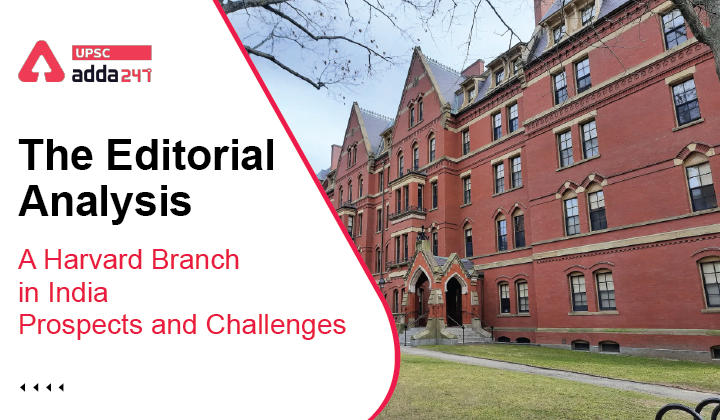Table of Contents
Foreign universities in India: Relevance
- GS 2: Issues relating to development and management of Social Sector/Services relating to Health, Education, Human Resources.
National education policy: Context
- India is changing its philosophy of Swadeshi in higher education, which is evident in National Education Policy (NEP) 2020 that promises higher education reforms in many areas, and internationalisation is prominent among them.
Foreign institution in India: A recent example
- Gujarat Biotechnology University: The Gujarat Biotechnology University is an example for new models of international academic partnerships emerging in India.
- It was established by the Department of Science and Technology of the Government of Gujarat in partnership with the University of Edinburgh, which assists the institution in developing strategies with regard to teaching, learning, research and innovation, and quality assurance, among others.
Foreign universities in India
- Currently, India does not allow the entry and the operation of foreign university branch campuses.
- The NEP 2020 was a turning point for the entry of foreign universities as it recommended allowing foreign universities ranked in the “top 100” category to operate in India.
- In the Budget 2022 it was announced that “world-class foreign universities and institutions would be allowed in the planned business district in Gujarat’s GIFT City and they would be free from domestic regulations to facilitate availability of high-end human resources.
- NEP 2020 recommended that only the “top 100” category will be allowed to operate in India.
- Union Minister of State, Ministry of Education has noted that two foreign institutions, from France and Italy, had expressed interest in setting up campuses in India.
Current initiatives
- A joint PhD programmes offered by the IIT Bombay-Monash Research Academy and the University of Queensland-IIT Delhi Academy of Research (UQIDAR), both with Australian partners.
- Melbourne-India Postgraduate Academy (MIPA) is a joint initiative of the IISc Bangalore, the IIT Madras, the IIT Kanpur and the IIT Kharagpur with the University of Melbourne. It provides students with an opportunity to earn a joint degree accredited both in India and Australia.
संपादकीय विश्लेषण: भारत में एक हार्वर्ड शाखा, संभावनाएं एवं चुनौतियां
Challenges
- Currently, India is the world’s second largest “exporter” of students which essentially means brain drain from India.
- It will not be easy to attract foreign universities to India and even more difficult to create the conditions for them to flourish as many of those top universities are already fully engaged overseas and would likely require incentives to set up in India.
- There are smaller but highly regarded universities outside the ‘top 500’ category that might be more interested, which is restricted by the NEP 2020.
- Many host countries have provided significant incentives, including building facilities and providing necessary infrastructure. Foreign universities are highly unlikely to invest significant funds up front.
- If bureaucratic hurdles cannot be drastically cut, there will be no success in attracting branch campuses.
Steps needed
- It is important to prevent profit-seekers from entering the Indian market and to encourage foreign institutions with innovative educational ideas and a long-term commitment.
- A recent study underlined that apart from allowing home institutions to repatriate surplus funds after tax clearance, a new accreditation mechanism, flexible visa rules for foreign students and faculty, financial incentives to offer programmes in priority areas should also be considered.
- It will be worthwhile to look at the experience of other countries for both positive and negative lessons. After examining national experiences elsewhere, clear policies can be implemented that may be attractive to foreign universities.
Read current affairs for UPSC




 UPSC Eligibility Criteria 2024- Age Limi...
UPSC Eligibility Criteria 2024- Age Limi...
 UPSC Prelims Exam Date 2024, Check New E...
UPSC Prelims Exam Date 2024, Check New E...
 UKPSC RO ARO Result 2024 Out, Download M...
UKPSC RO ARO Result 2024 Out, Download M...







